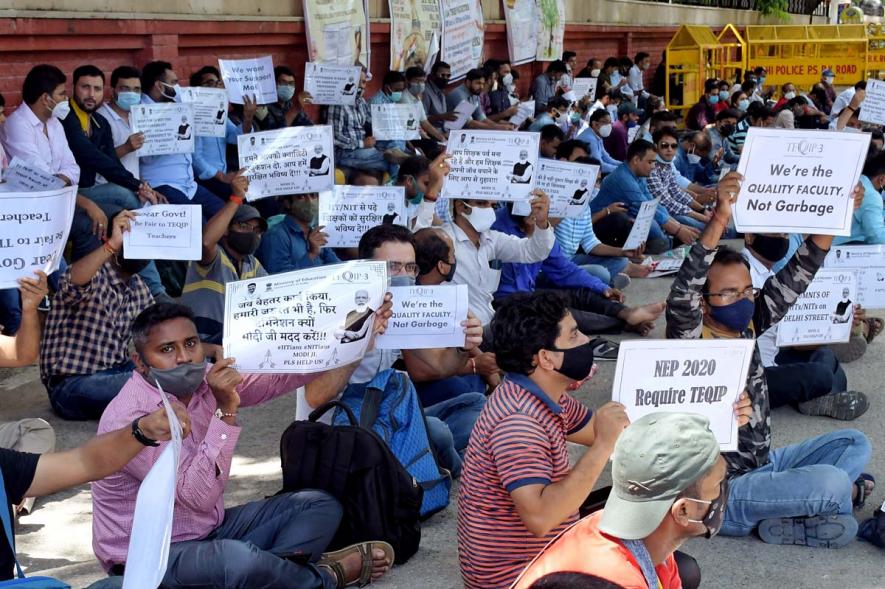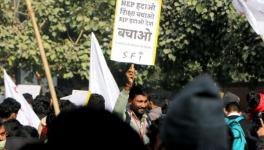‘Country’s Technical Education Would Lose Meaning if We’re Forced Out,’ say TEQIP Teachers

Image Courtesy: Rediffmail
Clad in a blue chequered shirt, Virendra Singh was waiting for his colleagues outside Shastri Bhawan, the multi-storey government building in New Delhi housing offices of the Union ministries of education, coal, and corporate affairs, among others. Singh and his colleagues were assembling to demonstrate outside the residence of Dharamender Pradhan, Union Minister of Education at Kushak Road in Lutyens’ Delhi.
Kumar has been teaching at Kamla Nehru Institute of Technology in Uttar Pradesh’s Sultanpur for three years under the Centre approved Technical Education Quality Improvement Programme (TEQIP). However, anxiety has dawned on him as the extension of the project is ending on September 30, and the state governments, in coordination with the Ministry of Education, are yet to come up with any sustainability plan providing permanent jobs to over 1,400 teachers.
The Union Ministry of Education started the Technical Education Quality Improvement Project (TEQIP-III) to improve the quality of engineering graduates at the cost of Rs. 2,300 crore for three years till 2020. The focus was on the most backward states like Jharkhand, Chhattisgarh, Bihar, North-East, Rajasthan, and Madhya Pradesh. After its completion, the project has been extended twice and will end on September 30.
Kumar, who did his PhD from the prestigious Indian Institute of Technology (IIT), Delhi, told NewsClick that teachers appointed under the programme were brought to improve the quality of technical education in the country, and most of the recruits had passed from premier institutes including IITs and NITs. He added that they were given appointments after a rigorous process. Still, they are awaiting letters from their respective colleges for permanent appointments.
He said, “When we joined the colleges, the teachers had no private cabins or proper classes. During the pandemic, teachers took their online classes from a single staff room. Despite adverse conditions, we engaged with the students, inspired them to work hard and become good engineers. The net result of our teaching and training got reflected when the National Board of Accreditation certified all colleges and their programmes. But all of a sudden, we are witnessing a situation that no teacher would ever imagine that we are no longer wanted. These state-run colleges got their accreditation due to our services, but they deny us job opportunities. This is sheer cheating.”
Kumar added that the crisis was not only felt by the families of teachers but students as well. He added, “When we teach our students, they see us as their role models. They often describe their will to join IITs. But what motivation will he get when he comes to know that you do not have a secured job. Our families and we are already facing the survival question, but the crisis faced by students is enormous and monumental.”
Kumar mentioned that the job loss would be hard to cope with as his wife had already left her job to live with him in Sultanpur and he would too face the same fate if the government did not come up with any sustainability plan. Kumar almost blasts out, talking about no opportunities. “Where are the jobs? Abdul Kalam Technical University recently issued its advertisement about vacancies. In 42 posts, only one post belongs to the mechanical engineering department. Just one post. How do they think it can resolve the crisis.” The colleagues of Kumar maintain that the jobs come with their own burden as there are no maternity leaves or leaves for other medical emergencies. “We have to take leave without pay if we need to attend such emergencies,” said another teacher.
Anand Chaturvedi, who has been leading the protest, told NewsClick that the government has to lose much if the teachers were forced out of their job. He said, “The central government spent crores on money on our training precisely for the purposes of teaching. The money would be a waste too.”
Looking deeper into documents, the National Project Implementation Unit under the Ministry of Education, in its reminders to state governments, highlighted that the states were bound by the Memorandum of Understanding signed between the Union Ministry of Education and state governments. In one such letter written in August to Radha Chauhan, Additional Chief Secretary of Vocational Education and Skill Development, Government of Uttar Pradesh, P M Khodke, Central Project Advisor, emphasised that the funding from the Centre “will be based on an understanding with state governments that well performing faculty hired by using project funds will be retained post project, all else unchanged and any of these faculties retained, will be paid exclusively from state funds.” National Project Implementation Unit, which looks after the TEQIP project, works to implement World Bank assisted projects in technical education.
Kumar said, ”Though these project faculties have been a major boost to the institutes, they are available till the project period. As no regular recruitments have happened, the project closure will certainly result in huge faculty shortage in the institutes, bringing the academic activities to a standstill and defeating the primary objectives of TEQIP- III.” Teachers, however, are also enraged with the Centre’s handling of the crisis as the regulatory bodies are suggesting them ad-hoc jobs in state government-run colleges.
In the meeting of National Steering Committee, formed to look after the project in January 2021, Anil Sahasrabudhe, Chairman of All India Council of Technical Education, said, ”Due to the pandemic, private institutions are not hiring any faculty, which does not show a good future for the TEQIP faculties. They [the teachers] are also writing to AICTE to get them absorbed in the institutes.” Sahasrabudhe suggested that the Ministry of Education requests state governments urgently to allow the teachers to work on an ad-hoc basis in their state-governed institutes.
Sharing her story, Kranti Ingle appeared proud to have been the first engineer in her family, but despair soon shadowed her voice as she narrated her ordeal. She said, “Despite belonging to a family of backward class, I did my engineering in computers from the Indian Institute of Technology, Kharagpur. Our neighbours, people in poverty-stricken villages, looked at us with hope and told their daughters that they could also fulfil their dreams. What will happen to those dreams if they see us wandering on the streets without any job?”
Ingle left her stunning question for governments to ponder upon, “We brought good results. We were given the best increments based on our performance. Now, are we being punished for it?”
Get the latest reports & analysis with people's perspective on Protests, movements & deep analytical videos, discussions of the current affairs in your Telegram app. Subscribe to NewsClick's Telegram channel & get Real-Time updates on stories, as they get published on our website.
























